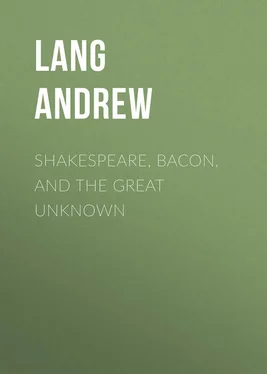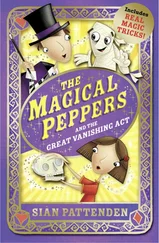Andrew Lang - Shakespeare, Bacon, and the Great Unknown
Здесь есть возможность читать онлайн «Andrew Lang - Shakespeare, Bacon, and the Great Unknown» — ознакомительный отрывок электронной книги совершенно бесплатно, а после прочтения отрывка купить полную версию. В некоторых случаях можно слушать аудио, скачать через торрент в формате fb2 и присутствует краткое содержание. Жанр: foreign_antique, foreign_prose, на английском языке. Описание произведения, (предисловие) а так же отзывы посетителей доступны на портале библиотеки ЛибКат.
- Название:Shakespeare, Bacon, and the Great Unknown
- Автор:
- Жанр:
- Год:неизвестен
- ISBN:нет данных
- Рейтинг книги:4 / 5. Голосов: 1
-
Избранное:Добавить в избранное
- Отзывы:
-
Ваша оценка:
- 80
- 1
- 2
- 3
- 4
- 5
Shakespeare, Bacon, and the Great Unknown: краткое содержание, описание и аннотация
Предлагаем к чтению аннотацию, описание, краткое содержание или предисловие (зависит от того, что написал сам автор книги «Shakespeare, Bacon, and the Great Unknown»). Если вы не нашли необходимую информацию о книге — напишите в комментариях, мы постараемся отыскать её.
Shakespeare, Bacon, and the Great Unknown — читать онлайн ознакомительный отрывок
Ниже представлен текст книги, разбитый по страницам. Система сохранения места последней прочитанной страницы, позволяет с удобством читать онлайн бесплатно книгу «Shakespeare, Bacon, and the Great Unknown», без необходимости каждый раз заново искать на чём Вы остановились. Поставьте закладку, и сможете в любой момент перейти на страницу, на которой закончили чтение.
Интервал:
Закладка:
But ours is not a generation to be overawed by “Authority” (as it is called). A small but eager company of scholars have convinced themselves that Francis Bacon wrote the Shakespearean plays. That is the point of agreement among these enthusiasts: points of difference are numerous: some very wild little sects exist. Meanwhile multitudes of earnest and intelligent men and women, having read notices in newspapers of the Baconian books, or heard of them at lectures and tea-parties, disbelieve in the authorship of “the Stratford rustic,” and look down on the faithful of Will Shakespere with extreme contempt.
From the Baconians we receive a plain straightforward theory, “Bacon wrote Shakespeare,” as one of their own prophets has said. 12 12 Francis Bacon Wrote Shakespeare . By H. Crouch-Batchelor, 1912.
Since we have plenty of evidence for Bacon’s life and occupations during the period of Shakespearean poetic activity, we can compare what he was doing as a man, a student, a Crown lawyer, a pleader in the Courts, a political pamphleteer, essayist, courtier, active member of Parliament, and so on, with what he is said to have been doing – by the Baconians; namely, writing two dramas yearly.
But there is another “Anti-Willian” theory, which would dethrone Will Shakspere, and put but a Shadow in his place. Conceive a “concealed poet,” of high social position, contemporary with Bacon and Shakespeare. Let him be so fond of the Law that he cannot keep legal “shop” out of his love Sonnets even. Make him a courtier; a statesman; a philosopher; a scholar who does not blench even from the difficult Latin of Ovid and Plautus. Let this almost omniscient being possess supreme poetic genius, extensive classical attainments, and a tendency to make false quantities. Then conceive him to live through the reigns of “Eliza and our James,” without leaving in history, in science, in society, in law, in politics or scholarship, a single trace of his existence. He left nothing but the poems and plays usually attributed to Will. As to the date of his decease, we only know that it must necessarily have been later than the composition of the last genuine Shakespearean play – for this paragon wrote it.
Such is the Being who occupies, in the theory of the non-Baconian, but not Anti-Baconian , Anti-Willians, the intellectual throne filled, in the Will Shakespeare theory, by Will; and in the Baconian, by Bacon – two kings of Brentford on one throne.
We are to be much engaged by the form of this theory which is held by Mr. G. G. Greenwood in his The Shakespeare Problem Restated . In attempting to explain what he means I feel that I am skating on very thin ice. Already, in two volumes ( In Re Shakespeare , 1909, and The Vindicators of Shakespeare ), Mr. Greenwood has accused his critics of frequently misconceiving and misrepresenting his ideas: wherefore I also tremble. I am perfectly confident in saying that he “holds no brief for the Baconians.” He is not a Baconian. His position is negative merely: Will of Stratford is not the author of the Shakespearean plays and poems. Then who is? Mr. Greenwood believes that work by an unknown number of hands exists in the plays first published all together in 1623. Here few will differ from him. But, setting aside this aspect of the case, Mr. Greenwood appears to me to believe in an entity named “Shakespeare,” or “the Author,” who is the predominating partner; though Mr. Greenwood does not credit him with all the plays in the Folio of 1623 (nor, perhaps, with the absolute entirety of any given play). “The Author” or “Shakespeare” is not a syndicate (like the Homer of many critics), but an individual human being, apparently of the male sex. As to the name by which he was called on earth, Mr. Greenwood is “agnostic.” He himself is not Anti-Baconian. He does not oust Bacon and put the Unknown in his place. He neither affirms nor denies that Bacon may have contributed, more or less, to the bulk of Shakespearean work. To put it briefly: Mr. Greenwood backs the field against the favourite (our Will), and Bacon may be in the field. If he has any part in the whole I suspect that it is “the lion’s part,” but Mr. Greenwood does not commit himself to anything positive. We shall find (if I am not mistaken) that Mr. Greenwood regards the hypothesis of the Baconians as “an extremely reasonable one,” 13 13 The Shakespere Problem Restated , p. 293.
and that for his purposes it would be an extremely serviceable one, if not even essential. For as Bacon was a genius to whose potentialities one can set no limit, he is something to stand by, whereas we cannot easily believe – I cannot believe – that the actual “Author,” the “Shakespeare” lived and died and left no trace of his existence except his share in the works called Shakespearean.
However, the idea of the Great Unknown has, for its partisans, this advantage, that as the life of the august Shade is wholly unknown, we cannot, as in Bacon’s case, show how he was occupied while the plays were being composed. He must , however, have been much at Court, we learn, and deep in the mysteries of legal terminology. Was he Sir Edward Coke? Was he James VI and I?
It is hard, indeed, to set forth the views of the Baconians and of the “Anti-Willians” in a shape which will satisfy them. The task, especially when undertaken by an unsympathetic person, is perhaps impossible. I can only summarise their views in my own words as far as I presume to understand them. I conceive the Baconians to cry that “the world possesses a mass of transcendent literature, attributed to a man named William Shakespeare .” Of a man named William Shakspere (there are many varieties of spelling) we certainly know that he was born (1564) and bred in Stratford-on-Avon, a peculiarly dirty, stagnant, and ignorant country town. There is absolutely no evidence that he (or any Stratford boy of his standing) ever went to Stratford school. His father, his mother, and his daughter could not write, but, in signing, made their marks; and if he could write, which some of us deny, he wrote a terribly bad hand. As far as late traditions of seventy or eighty years after his death inform us, he was a butcher’s apprentice; and also a schoolmaster “who knew Latin pretty well”; and a poacher. He made, before he was nineteen, a marriage tainted with what Meg Dods calls “ante-nup.” He early had three children, whom he deserted, as he deserted his wife. He came to London, we do not know when (about 1582, according to the “guess” of an antiquary of 1680); held horses at the door of a theatre (so tradition says), was promoted to the rank of “servitor” (whatever that may mean), became an actor (a vagabond under the Act), and by 1594 played before Queen Elizabeth. He put money in his pocket (heaven knows how), for by 1597 he was bargaining for the best house in his native bourgade . He obtained, by nefarious genealogical falsehoods (too common, alas, in heraldry), the right to bear arms; and went on acting. In 1610–11 (?) he retired to his native place. He never took any interest in his unprinted manuscript plays; though rapacious, he never troubled himself about his valuable copyrights; never dreamed of making a collected edition of his works. He died in 1616, probably of drink taken. Legal documents prove him to have been a lender of small sums, an avid creditor, a would-be encloser of commons. In his will he does not bequeath or mention any books, manuscripts, copyrights, and so forth. It is utterly incredible, then, that this man wrote the poems and plays, so rich in poetry, thought, scholarship, and knowledge, which are attributed to “William Shakespeare.” These must be the works of “a concealed poet,” a philosopher, a courtier moving in the highest circles, a supreme legist, and, necessarily, a great poet, and student of the classics.
Читать дальшеИнтервал:
Закладка:
Похожие книги на «Shakespeare, Bacon, and the Great Unknown»
Представляем Вашему вниманию похожие книги на «Shakespeare, Bacon, and the Great Unknown» списком для выбора. Мы отобрали схожую по названию и смыслу литературу в надежде предоставить читателям больше вариантов отыскать новые, интересные, ещё непрочитанные произведения.
Обсуждение, отзывы о книге «Shakespeare, Bacon, and the Great Unknown» и просто собственные мнения читателей. Оставьте ваши комментарии, напишите, что Вы думаете о произведении, его смысле или главных героях. Укажите что конкретно понравилось, а что нет, и почему Вы так считаете.












